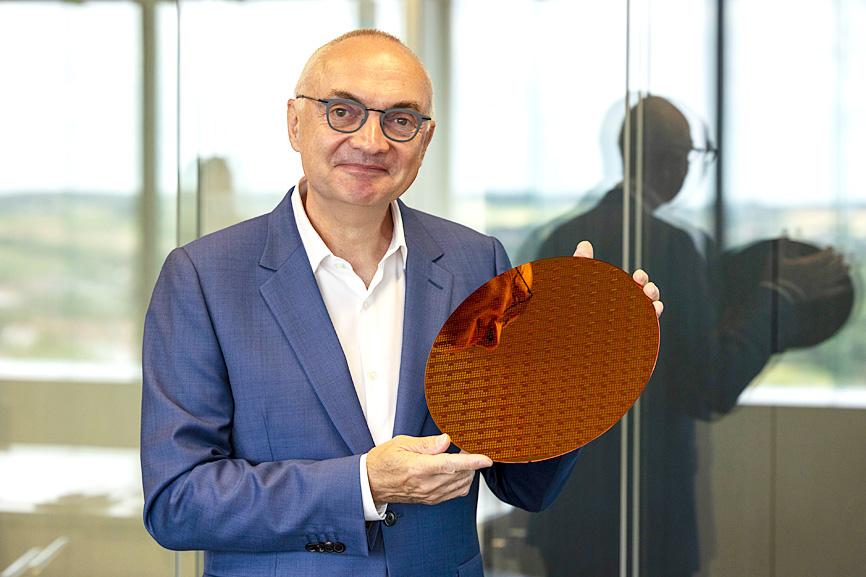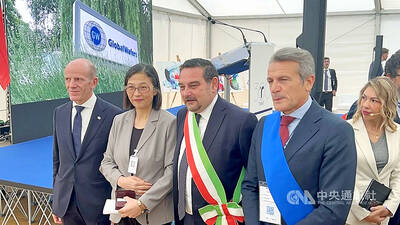Focusing on bilateral cooperation in the semiconductor industry, the Taiwan-Belgium Joint Business Council meeting, the most important annual business event between the countries, is to take place on Thursday next week, the Belgian Office Taipei said.
Due to COVID-19, the meeting for a second consecutive year is to be a hybrid Webinar, with Taiwanese business representatives gathered in Taipei and their Belgian counterparts joining online, the Belgian office said.
The semiconductor industry is to be the primary focus, given that Taiwan is a leader in the field amid a global chip shortage, the office said.

Photo: Bloomberg
The EU in February unveiled the European Chips Act, which eases rules restricting the use of state aid to attract companies such as Intel Corp and Taiwan Semiconductor Manufacturing Co (台積電) to manufacture more chips in the region.
Belgium is home to the world’s leading semiconductor research and development institution, the Interuniversity Microelectronics Centre (IMEC), the office said.
The act encourages Belgium — home to the EU capital, Brussels — to showcase its advantages in the semiconductor market and to attract Taiwanese companies to invest in European projects, it said.
The highlight of the meeting is to be an address by IMEC chief strategy officer Jo de Boeck on “full-stack” innovation trends in the global semiconductor industry, the office said.
The annual meeting, first held in 1981, typically alternates between Belgium and Taiwan, but has taken place in a hybrid format since the emergence of COVID-19.
Belgium is Taiwan’s fifth-largest trading partner among EU member states, after Germany, the Netherlands, Italy and France, government data showed.
In 2020, trade between the two nations totaled US$2.19 billion.
Meanwhile, a delegation led by Minister Without Portfolio John Deng (鄧振中) is to attend the SelectUSA Investment Summit in June, an Executive Yuan official said on Tuesday on condition of anonymity.
The summit is an annual US Department of Commerce event that focuses on facilitating investment that creates US jobs, and is to take place this year in Maryland from June 26 to 29.
Several Taiwan-based firms, especially those in the semiconductor and 5G sectors, are expected to attend, alongside US business representatives, along with federal and state officials.
The semiconductor and 5G sectors were highlighted at the Economic Prosperity Partnership Dialogue that was held virtually in November last year.
The Executive Yuan official said that although the list of Taiwanese participants has yet to be finalized, the American Institute in Taiwan, the US’ de facto embassy, had sent invitations to several prominent government officials, including National Development Council Minister Kung Ming-hsin (龔明鑫).
The Biotechnology and Pharmaceutical Industries Promotion Office said that SelectUSA has since its inception attracted US$59 billion in direct investment to the US and created 49,000 jobs there.
Last year, 28 US state governors and eight federal government officials took part in the summit.

RECYCLE: Taiwan would aid manufacturers in refining rare earths from discarded appliances, which would fit the nation’s circular economy goals, minister Kung said Taiwan would work with the US and Japan on a proposed cooperation initiative in response to Beijing’s newly announced rare earth export curbs, Minister of Economic Affairs Kung Ming-hsin (龔明鑫) said yesterday. China last week announced new restrictions requiring companies to obtain export licenses if their products contain more than 0.1 percent of Chinese-origin rare earths by value. US Secretary of the Treasury Scott Bessent on Wednesday responded by saying that Beijing was “unreliable” in its rare earths exports, adding that the US would “neither be commanded, nor controlled” by China, several media outlets reported. Japanese Minister of Finance Katsunobu Kato yesterday also

‘DRAMATIC AND POSITIVE’: AI growth would be better than it previously forecast and would stay robust even if the Chinese market became inaccessible for customers, it said Taiwan Semiconductor Manufacturing Co (TSMC, 台積電) yesterday raised its full-year revenue growth outlook after posting record profit for last quarter, despite growing market concern about an artificial intelligence (AI) bubble. The company said it expects revenue to expand about 35 percent year-on-year, driven mainly by faster-than-expected demand for leading-edge chips for AI applications. The world’s biggest contract chipmaker in July projected that revenue this year would expand about 30 percent in US dollar terms. The company also slightly hiked its capital expenditure for this year to US$40 billion to US$42 billion, compared with US$38 billion to US$42 billion it set previously. “AI demand actually

Jensen Huang (黃仁勳), founder and CEO of US-based artificial intelligence chip designer Nvidia Corp and Taiwan Semiconductor Manufacturing Co (TSMC, 台積電) on Friday celebrated the first Nvidia Blackwell wafer produced on US soil. Huang visited TSMC’s advanced wafer fab in the US state of Arizona and joined the Taiwanese chipmaker’s executives to witness the efforts to “build the infrastructure that powers the world’s AI factories, right here in America,” Nvidia said in a statement. At the event, Huang joined Y.L. Wang (王英郎), vice president of operations at TSMC, in signing their names on the Blackwell wafer to

Taiwan-based GlobalWafers Co., the world’s third largest silicon wafer supplier, on Wednesday opened a 12-inch silicon wafer plant in Novara, northern Italy - the country’s most advanced silicon wafer facility to date. The new plant, coded “Fab300,” was launched by GlobalWafers’ Italian subsidiary MEMC Electronics Materials S.p.A at a ceremony attended by Taiwan’s representative to Italy Vincent Tsai (蔡允中), MEMC President Marco Sciamanna and Novara Mayor Alessandro Canelli. GlobalWafers Chairwoman Doris Hsu (徐秀蘭) said the investment marked a milestone in the company’s expansion in Europe, adding that the Novara plant will be powered entirely by renewable energy - a reflection of its